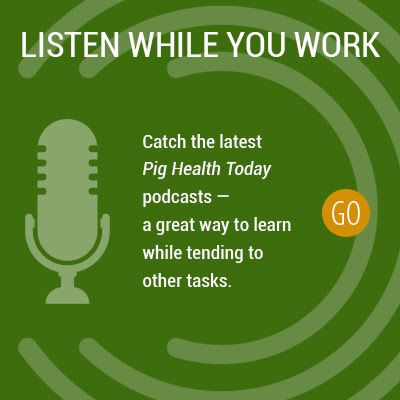Greenway: ‘Don’t be afraid to engage’ consumers on antibiotics, welfare
Pork producers should find more ways to engage with consumers and share their stories about responsible antibiotic use and welfare, says Brad Greenway, America’s Pig Farmer of the Year in 2016.
Consumers are hugely interested in learning about where their food comes from and how it is produced, he told Pig Health Today.
And with fewer people having direct links to farms, it is the producers’ responsibility to tell the industry’s story.
“It used to be that everyone had a connection [to agriculture], but now you don’t have that,” said Greenway, who produces wean-to-finish pigs on his unit in Mitchell, South Dakota.
“It’s our role to get the message out.”
‘At the forefront’
Greenway said that learning to communicate with consumers is vital for the industry to counter negative messages around livestock production, particularly tough subjects such as antibiotics use and animal welfare.
“Animal welfare and antibiotics are at the forefront [when I speak to non-farming audiences],” he said.
“We need to address the responsible use of antibiotics but still convey the message that every day we take care of our animals and use them responsibly.”
Greenway said that while antibiotics and animal care can be controversial subjects, there are lots of positive things producers can talk about, particularly around the environment and sustainability of US hog farms.
“We have a great story to tell,” he said. “We keep our animals healthy and comfortable; we use less feed; we have a carbon calculator.
“When you explain what we are doing, we have a great story to tell and we have to tell it.
Step out of comfort zone
While Greenway said he has talked to lots of consumer groups and retailers through his links with the US Farmers and Ranchers Association, he said all pig farmers can take steps to engage more with people outside agriculture.
Tools such as Twitter, Facebook and other social media provide producers with a simple way to connect with people and share the sector’s story, he added.
“Every farmer can play a role; it doesn’t have to be a lot. Use social media, post a picture or a video, engage in a conversation.
“Don’t be afraid to take the first step. Have a conversation somewhere where you’re not comfortable, and see how it goes.
“People love farmers but they don’t necessarily know what we do because farming has changed so much,” he added.
“I’d encourage everyone to step out of their comfort zone and don’t be afraid to engage.”
Posted on September 28, 2017

















